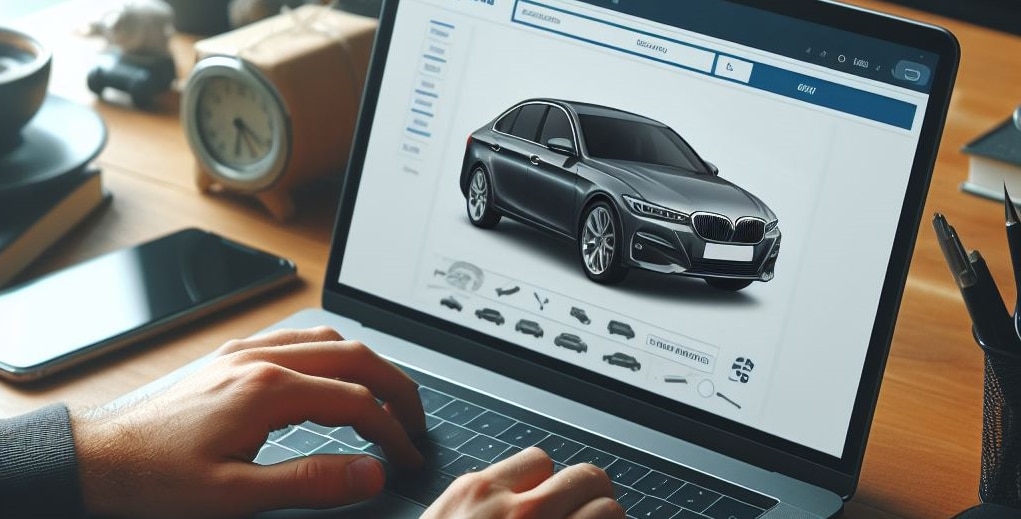You’re ready for a new set of wheels. Time to head to the dealership, test drive some models, and negotiate like a pro. Or you could boot up your laptop and start clicking from the comfort of your couch.
Online car shopping is a game-changer. You can shop anytime, anywhere, with access to a multitude of vehicles without the sales pressure. But is it right for you?
What it Means to Buy a Car Online
Many of us shop online for everything from clothes to groceries. A car, of course, is a larger purchase. It costs much more and so there is more at stake. You might be comfortable researching a car online, and even calculating loan payments. But there’s a comfort level to continuing the car buying process in the dealer showroom. However, more and more people are taking the plunge into online car shopping. They’re buying online from start to finish.
Pros & Cons
It’s ultra-convenient to shop for a car online.
- You don’t have to go to a dealership during business hours. You can shop on your schedule from any place.
- There is likely more inventory available online than at your local dealership.
- You can get pre-approved for a loan before you even start shopping.
- There is less sales pressure and no haggling. Prices are clearly posted, and what you pay ultimately depends on the base price, any trade-in, and your credit rating.
- You can fill out paperwork online at your leisure.
- Many online marketplaces have a short return window, so if the car wasn’t what you expected, you can return it.
- You can get the car delivered to your driveway.
Of course, there are some downsides.
- You can’t physically see the car or test drive it before you buy it. (Some services are offering test drives, however, and you can always test drive at a dealership before buying online.)
- You can’t negotiate the price.
- Online purchases often come with extra fees. It can cost $1,000 or more to deliver a car.
- Your financing choices may be limited. The seller may restrict you to a single lender.
- You cannot get your car the same day, as you would at a dealer.
- You can potentially get more incentives onsite at a dealer, such as lease specials or cash rebates.
Online Sellers
There are a variety of online vehicle sellers. Some new car dealers offer the full online experience, including car delivery. There are also services that sell used vehicles in online marketplaces. Still others connect buyers with private sellers. Each site has different terms and warranties, so make sure you understand them before you buy. Here are some of the most popular:
- Carvana offers used cars, auto loan prequalification, and a 7-day return window. Car delivery is not available everywhere and may include a shipping fee.
- CarMax also sells used cars. They can deliver a car for test driving (fees may apply). CarMax offers financing and has a 7-day return window.
- Vroom sells used cars with a 7-day or 250-mile return window. Vroom also offers access to online financing.
You may buy from private sellers on sites such as these:
- eBay Motors connects you with private sellers. The site offers free vehicle purchase protection that can cover you if there are problems with the sale.
- CarGurus also connects you with private sellers and offers support for paperwork including title transfers. They offer financing through their partner, Auto Pay.
Red flags
- Be careful with sellers that are not vetted by a third party. While you can find cars on Craigslist and Facebook Marketplace, it is more difficult to know if it’s a scam.
- Avoid bait-and-switch scenarios, where the car you want is suddenly not available, but another similar more expensive model is. If a seller does that, chances are there will be problems later with other items such as warranties.
- Beware of fraudulent websites. Make sure the site and the seller are legitimate. If the price is too good to be true, it probably is.
- Do not make a deal without a written agreement. Remember to read the fine print.
- Know what you can afford for a monthly payment, and then work backwards to determine how much you can finance.
- Know your credit score. Your credit rating is used to determine your interest rate.
- Pre-qualify for a loan. You can get a loan from a bank or credit union, or from the dealership or online marketplace where you will get your vehicle.
- Determine the type of car that fits your needs. Do you need a large SUV for off-roading and camping with the family? Perhaps you need the right car for your teen driver? Browse the online inventory to find the car that meets your budget and needs.
- Comparison shop across at least three websites to determine the best options. Consult Consumer Reports, Edmunds, and Kelley Blue Book to ensure that your car is priced at current market value.
- If you’re able to arrange a test drive, do so. You want to make sure that you can fit comfortably in the car, and you like how it handles. If all checks out, then go ahead with the purchase.
A car is one of your greatest investments. For added peace of mind, protect it with the right insurance.
This article is furnished by California Casualty, providing auto and home insurance to educators, law enforcement officers, firefighters, and nurses. Get a quote at 1.866.704.8614 or www.calcas.com.
- How to Properly Pack Your Fridge - February 24, 2026
- Staying in Control with Driver Assist - February 13, 2026
- Inexpensive Romantic Ways to Say “I Love You” - February 11, 2026

